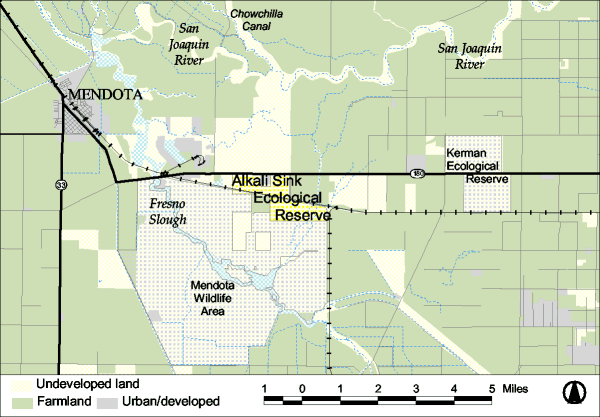Endangered Species Recovery Program | |
|
Home | News | Publications | Species profiles | Data and maps | About | Staff | Links | Department of Biological Sciences | CSU Stanislaus |
Ecology of palmate-bracted bird's-beak (Cordylanthus palmatus) at Alkali Sink Ecological Reserve, Fresno County
We are studying the distribution, survival and reproductive success, and potential host plants of palmate-bracted bird's-beak (Cordylanthus palmatus) at Alkali Sink Ecological Reserve, Fresno County, to further the recovery of this federal and California-listed endangered annual herb. Palmate-bracted bird's-beak is known to be extant at only eight localities, most of which are in the Sacramento and Livermore valleys. The Alkali Sink Ecological Reserve population is considered to be crucial to recovery because it incorporates genetic information not found elsewhere.
In 1998, palmate-bracted bird's-beak was not widely distributed throughout the Reserve. Approximately 1,600 individuals reached reproductive maturity in 1998, twice as many as previously thought to occur on the site. However, the survival rate from seedling stage to maturity was only 17.7%. Of the plants that survived to maturity, 73.2% produced at least some seeds. Mean seed production was 5.0 per fruit and 84.4 per plant. Palmate-bracted bird's-beak seemed to be thriving in areas that had been graded or flooded in previous years, but not in areas that had burned. The two most common associates of palmate-bracted bird's-beak at Alkali Sink Ecological Reserve were rusty molly (Kochia californica) and bush seepweed (Suaeda moquinii), which occurred within a 0.5-meter radius of palmate-bracted bird's-beak at 68.3% and 53.3% of sampling points, respectively. These two perennial species are likely host plants for palmate-bracted bird's-beak, which obtains water and nutrients from the roots of other plants. In the coming years, we plan to assess indicators of population stability and identify limiting life-history stages, which will help to focus future recovery efforts.
